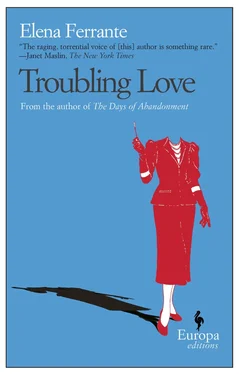“I don’t know. So many people come here.”
I glanced at the people the salesgirl had alluded to: women who talked loudly in a dialect marked by a forced cheer, who laughed noisily, flaunted expensive jewelry, came out of the fitting rooms in bra and underpants or in tiny gold, silver, or leopard-print bathing suits, displayed abundant flesh striped by stretch marks and dented by cellulite, gazed at pubis and buttocks, pushed their breasts up with cupped hands, ignored the saleswomen, and, in those poses, turned to a man who was a kind of floorwalker, well dressed and already tanned, installed there purposely to channel the flow of money and cast threatening glances at the ineffectual salesgirls.
It wasn’t the clientele I had imagined. They seemed women whose men had got rich suddenly and easily, hurling them into a provisional luxury that they were compelled to enjoy, and whose subculture was like a damp crowded basement, with semi-porn comic strips, with obscenities used as refrains. They were women forced into a city-prison, corrupted first by poverty and now by money, with no interruption. Seeing them and hearing them, I realized that I was getting nervous. They behaved with that man the way my father imagined women behaved, the way he imagined his wife behaved as soon as he turned his back, the way Amalia, too, perhaps, had for her whole life dreamed of behaving: a woman of the world who bends over without having to place two fingers at the center of her neckline, crosses her legs without worrying about her skirt, laughs coarsely, covers herself with costly objects, her whole body brimming with indiscriminate sexual offerings, ready to joust face to face with men in the arena of the obscene.
I made an uncontrollable grimace of annoyance. I said:
“She’s the same height as I am, with only a little white in her hair. But she wears it in an old-fashioned style, no one does it like that anymore. She came with a man of about seventy, but pleasant, slender, with thick white hair. A handsome couple, to look at. You ought to remember them, they bought all these things.”
The salesgirl shook her head, she didn’t remember.
“So many people come here,” she said. Then she glanced at the floorwalker, worried about the time she was wasting, and suggested to me: “Try them on. They look just your size. If the dress is tight. . ”
“I’d like to speak to that man. . ” I ventured.
The salesgirl pushed me toward a fitting room, anxious about that barely articulated request.
“If the underpants don’t fit, take another pair. . we’ll give you a discount,” she offered. And I found myself in a tiny room that was all rectangular mirrors.
I sighed, and wearily took off the funeral dress. I had less and less tolerance for the frenetic chatter of the customers, which in there seemed not muffled but, rather, amplified. After a moment of hesitation I also took off the underpants of my mother’s that I had put on the night before and changed into the lace ones that I had found in her bag. They were exactly my size. Puzzled, I ran a finger along the rip in the side that Amalia had probably made putting them on and then pulled over my head the rust-colored dress. It came to about two inches above my knees and the neckline was too low. But it wasn’t at all too tight; rather, it slid over my tense and muscular thinness and softened it. I came out of the fitting room tugging the dress on one side, staring at one calf and saying aloud:
“Look, you can see, the dress is tight here on the side. . and anyway it’s too short.”
But beside the young salesgirl now was the man, who appeared to be in his forties, with a black mustache, at least eight inches taller than me, broad in the shoulders and chest. Both his features and his body were inflated, threatening; only his gaze was not unpleasant but lively, familiar. He said, in a TV Italian, but without kindness, without even a hint of the willing compliance that he showed with the other customers, in fact visibly striving to be formal with me:
“It looks very good on you, it’s not at all too tight. That’s the style.”
“It’s precisely the style that I’m not sure about. My mother chose it without me. . ”
“She made a good choice. Keep your dress and enjoy it.”
I stared at him for a second, in silence. I felt that I wanted to do something either to him or to myself. I glanced at the other customers. I pulled the dress up over my hips and turned toward one of the mirrors.
“Look at the panties,” I pointed to the mirror, “they’re tight on me.”
The man changed neither his expression nor his tone.
“Madam, I don’t know what to tell you, you don’t even have the receipt,” he said.
I saw myself in the mirror, my legs thin and bare: I pulled down the dress, uneasy. I picked up the old dress and the underpants, put everything in the bag and searched at the bottom for the plastic case with Amalia’s identification card.
“You ought to remember my mother,” I tried again, pulling out the document and opening it right in front of him.
The man gave a quick look and seemed to lose patience. He switched to dialect.
“My dear lady, we can’t waste time here,” he said, and gave back the document.
“I’m only asking you. . ”
“Merchandise that’s been sold can’t be exchanged.”
“I’m only asking you. . ”
He advanced to a light touch on the shoulder.
“Are you playing games? Did you come to play games?”
“Don’t you dare touch me. . ”
“No, you really are joking. . go on, take your things and your document. Who sent you? What do you want? Tell whoever sent you to come and get the cash personally. Then we’ll see! In fact, here’s my card: Antonio Polledro, name, address, and telephone number. You’ll find me here or at home. All right?”
It was a tone that I knew very well. Immediately afterward he would begin to push me harder and then to strike me, without regard to whether I was a man or a woman. I tore the document from his hand with calculated disdain, and to discover what had so unnerved him I looked at the photograph of my mother. The long, baroquely sculpted hair on her forehead and around her face had been carefully scraped away. The white that emerged around her head had been changed with a pencil to a nebulous gray. With the same pencil someone had slightly hardened the features of her face. The woman in the photograph wasn’t Amalia: it was me.
I went out into the street carrying my things. I realized that I still had the identity card in my hand, and I put it back in the plastic case, automatically sticking Polledro’s card in with it. I slipped everything into my purse and looked around in a daze, glad that Uncle Filippo really had waited for me at the corner.
I immediately regretted it. His eyes widened and his mouth gaped, revealing his few long, nicotine-stained teeth. He was astonished, but astonishment was quickly turning into antagonism. I couldn’t immediately understand why. Then I realized that it was the dress I was wearing. I made an effort to smile at him, certainly to calm him down but also to get rid of the impression that I had lost control of my face, that I had a face that had been adapted from Amalia’s.
“Does it look bad?” I asked.
“No,” he said sulkily, clearly lying.
“Then what?”
“We buried your mother yesterday,” he complained in a voice that was too loud.
I thought of revealing, just to annoy him, that the dress was actually Amalia’s but foresaw in time that it was I who would be annoyed: he would surely start railing against his sister again.
“I was depressed and I wanted to give myself a present.”
“You women get depressed too easily,” he burst out, suddenly forgetting, with that “too easily,” what he had just reminded me of: that we had a short time ago buried my mother and I had good reason to be depressed.
Читать дальше












